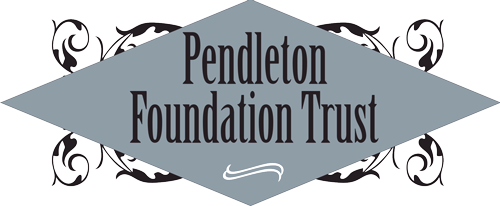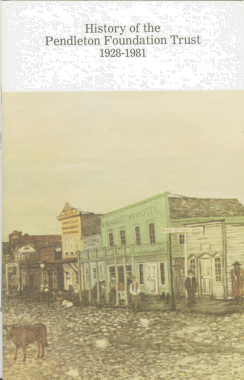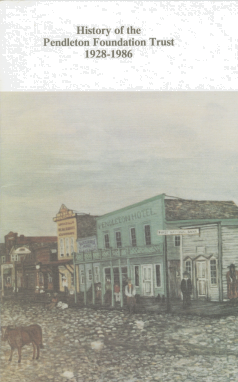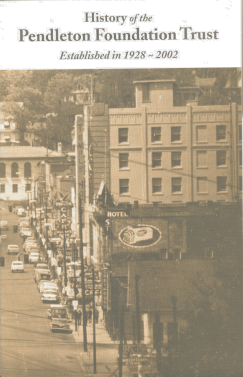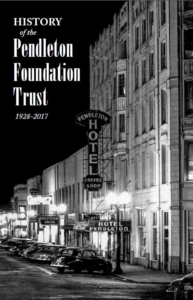The History of the Foundation, Part 1 of 3
The present Trust Board dedicates this history to those citizens of Pendleton who have given of their time and energy to serve on the Pendleton Foundation Board; to those many citizens and organizations who have seen needs, and with the financial assistance from the Pendleton Foundation, have been able to complete projects which have bettered the Pendleton community; and to those many persons, both from Pendleton and from the surrounding area, who have over the years made financial contributions, both large and small, to the Pendleton Foundation. It is through the efforts of all of these people that we, as citizens of Pendleton, are able to enjoy a richer life and to share in the many noteworthy additions to our city from the Pendleton Foundation.
In 1981 Pendletonians could look with satisfaction at the record of an institution that has served the community for 53 years; an institution that, upon its establishment in 1928, was unique in the state of Oregon. This institution is the Pendleton Foundation, a community trust fund that has generously contributed to the city’s civic, educational and charitable needs. From its very beginning the Foundation has been praised both within the city and throughout the state as an example of Pendleton’s community spirit at its very best, and this praise continues even today.
An examination of the various. organizations and projects that have benefited from Pendleton Foundation contributions provides testimony to its value. The city of Pendleton, School District 16-R, the Umatilla County Library, Pendleton Community Hospital, the Rangers Drum and Bugle Corps and the Pendleton Little League are but a few of the many recipients. The gifts have been used to purchase such things as playground equipment, library books, educational video tapes and new robes for the Pendleton High School Choir.
Today the Pendleton Foundation controls over $4,000,000 through its trustee banks and is able to give between $160,000 – $200,000 in gifts annually. It is clear that the Pendleton Foundation will continue to play a significant role in community growth and improvement for a very long time.
The Pendleton Foundation was officially started on May 10, 1928 with a Resolution and Declaration of Trust. The conception of such an institution had been alive much longer, however, in the minds of those on the Civic Committee of the Pendleton Commercial Association (the equivalent of the present Pendleton Chamber of Commerce). Led by Association manager and committee secretary, George Baer, the committee had methodically researched the operations of other trust funds across the nation to find the type that would most effectively suit Pendleton’s needs. They sought to provide a means for citizens to contribute to the community by giving a gift in memory of someone who had passed away or as a simple donation. Memorial funds could also be established through. wills or by those who were still living and wanted to see the results of their contribution. The donations would have the additional advantage of being tax exempt or, in the case of willed bequests, causing estate and inheritance taxes to be reduced.
The creation of the trust was an outgrowth of Colonel James H. Raley’s interest in a trust that had been created by citizens of the city of Cleveland, Ohio. Raley was another of the members of the committee. The language of the Pendleton Foundation Trust, in large measure, followed the provisions of the one earlier created in Cleveland. The purpose of this new trust was best expressed in the Foundation’s Resolution and Declaration:
-
To assist civic and educational undertakings whether now supported by private gifts or public taxation.
-
To promote educational and scientific research.
-
To improve living conditions or to provide recreation or recreational grounds for all classes.
-
For such other civic or public purposes as will best make for the mental, moral and physical improvement of the inhabitants of the City of Pendleton, according to the discretion of the majority in number of a committee to be constituted as hereinafter provided and to be called and known as the Pendleton Foundation Committee.
The organization of the Foundation was based on the model of several trust funds located in eastern cities that had accumulated millions of dollars. The donations would be held by local banks that had been designated as trustees for the fund. The two banks chosen to act in this capacity were the First National Bank and the Inland Empire Bank (the latter, of which in time would be replaced by the United States National Bank). `
Each year, it was decided, the income created by interest on the fund would be distributed by the trustees to recipients designated by the Foundation Committee, a group of seven citizens selected for their “knowledge of civic, educational and charitable needs of the City of Pendleton.” To prevent any conflicts of interest, no person holding a public office was allowed to serve on the committee, nor were more than two members to be of the same religious denomination. One member was to be appointed by the mayor for a one year term, another was chosen by the school board for two years and a third was selected by the Board of Managers of the Commercial Association of Pendleton (now the Chamber of Commerce) for three years. The other four were appointed by the Board of Trustees, one to serve for four years and the others to serve for five years. The board of Trustees, which was composed of a representative from both of the trustee banks and the Presiding Judge of the Circuit Court of the State of Oregon, also appointed a secretary to aid the committee.
The Commercial Association chose what the most flexible plan available was probably. Instead of having all contributions earmarked for a particular purpose, the money could be channeled to the most deserving causes each year. Changing economic and social conditions or the disappearance of organizations would not make the trust fund obsolete; the money could simply be used elsewhere. Trust funds with specific purposes stipulated could still be established, but the Foundation Committee reserved the right to divert the income for another purpose if circumstances changed so that compliance with the terms of the donation were made impossible.
With this organizational planning accomplished, the first Foundation Committee was appointed in September, 1928. The Board of Trustees named J. H. Raley, James E. Akey, N. D. Swearingen and James S. Johns to positions. R. M. Crommelin was appointed by the Commercial Association. The mayor selected James A. Fee and the School Board appointed Mrs. E. W. McComas. Mrs. McComas was unable to serve because of an illness, however, and Guy Matlock was chosen to replace her.
The press was quick to praise the new Foundation. An editorial in the Portland Oregon Journal of July 23, 1928 noted that Pendleton had established the first permanent trust fund of its type in the state, adding that “Pendleton has done what Portland has long been urged to do.” In back of the Foundation, the editorial continued, “is the spirit of Pendleton. Back of it is the nationwide search for the best program, made by George C. Baer, manager of the Pendleton Commercial Association. Back of it is the purpose that the citizens of no other city than Pendleton shall have more lasting safeguards of their philanthropies, or living conditions and opportunities of higher standard.” The paper encouraged Portland and other communities to follow Pendleton’s example.
The Pendleton East Oregonian and its editor, E. B. Aldrich, were enthusiastic supporters from the very start, keeping readers well informed of the Foundation’s development. In an editorial entitled “It Will Be a Test” the paper stated that the Foundation would provide a good way for citizens to remember the city by donating money through their wills.
History Books
History, 1928-1981, this first booklet on the history of the Foundation provides a review of how things started and the many grants given and the board members serving the community.
History, 1928-1986, the second installment modified the first booklet with the additional number of years
History, 1928-2002, entering a new century the Foundation updated its history and provided another listing of grants awarded and those serving on the board.
History, 1928 – 2018, celebrate the 90th year of the Pendleton Foundation Trust with this latest history of our board members, grants, and awards.
